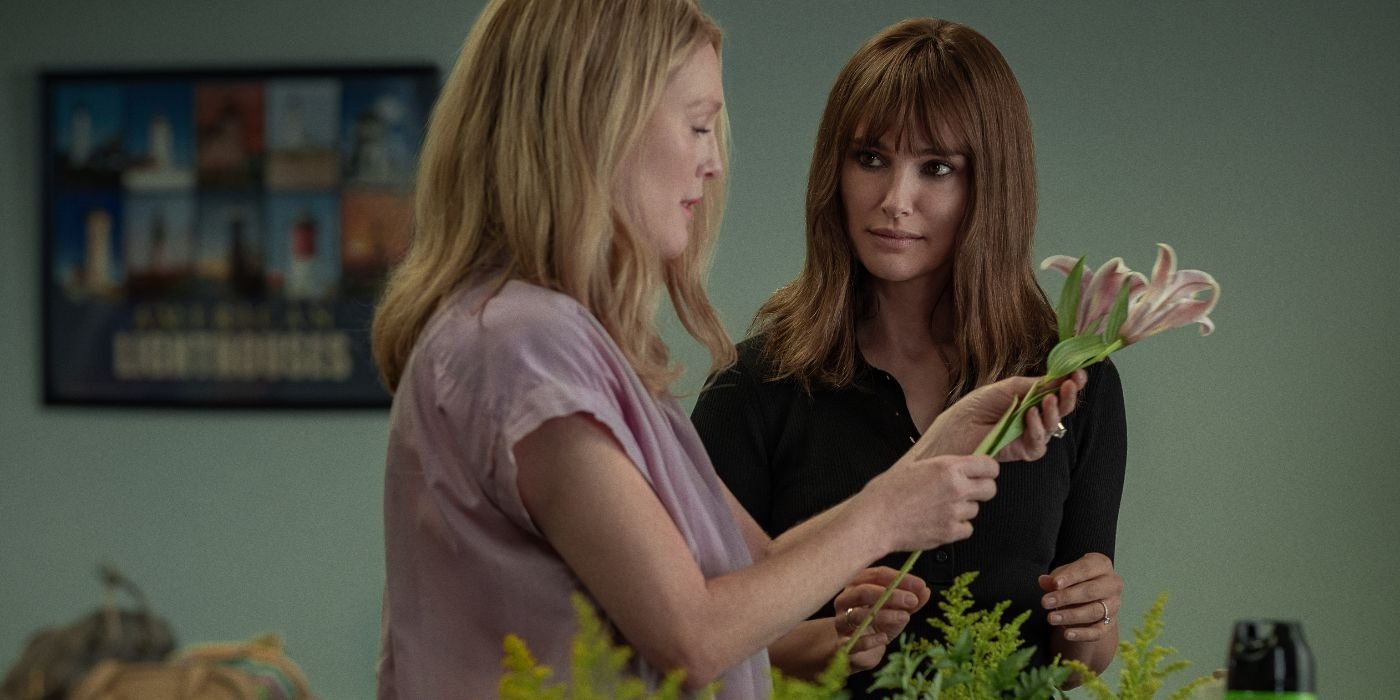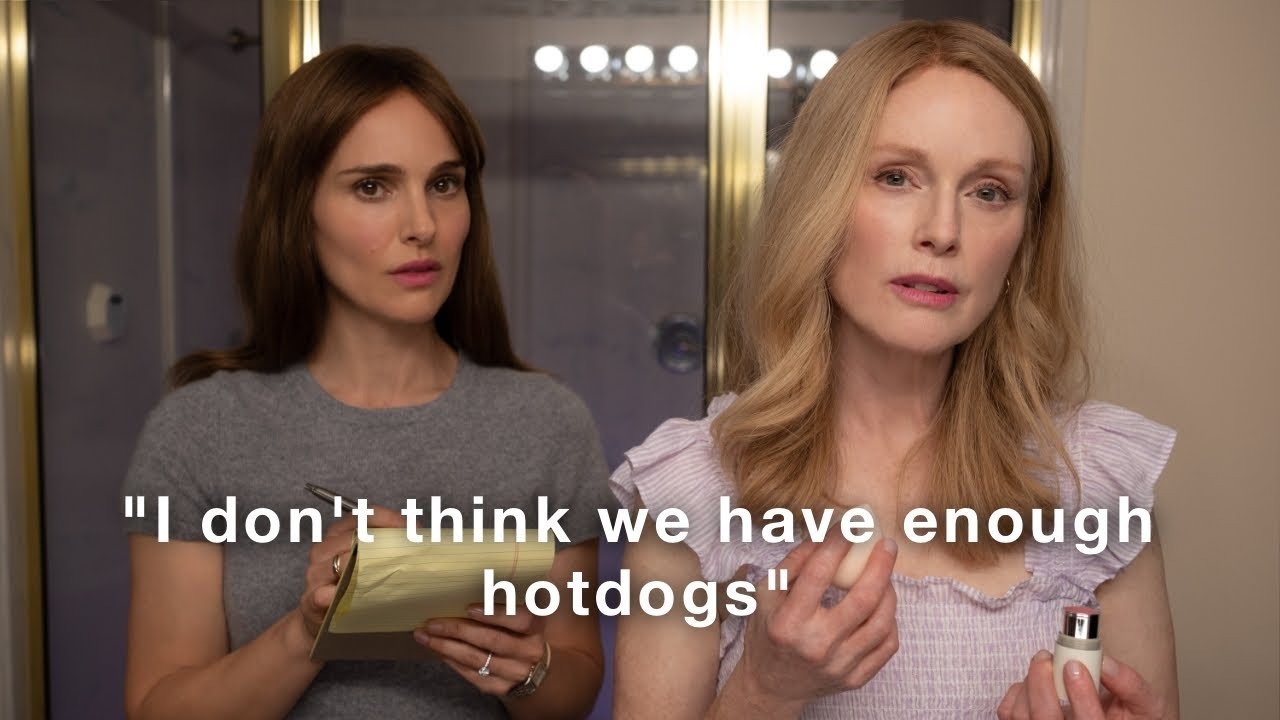Todd Haynes’ latest film, May December, has been generating conversation since its explosive debut at the 2023 Cannes Film Festival, stirring anticipation for its eventual release. This gripping drama brings together Academy Award-winning actresses Natalie Portman and Julianne Moore, working from a screenplay by Samy Burch.
Portman portrays Elizabeth, an actress who travels to Georgia to study Gracie (played by Moore), a woman whose controversial relationship with a 13-year-old boy made headlines in the 90s.

Now, over two decades later, Gracie and Joe (Charles Melton) are preparing to send their children off to college just as Hollywood decides to turn their past into a film. As events play out, the tension between Elizabeth, Gracie, and Joe escalates until it reaches an explosive breaking point.
Joe Begins to Question His Relationship with Gracie
Throughout May December, Joe starts re-evaluating his relationship with Gracie in a way he never had before. Though he has always been aware that many view him as a victim, it isn’t until Elizabeth subtly influences his thoughts that he truly begins to consider it.
Elizabeth frequently plants small, suggestive comments that make Joe reflect, but it all comes to a head on her final night in town when she invites him to her room. They sleep together, and afterward, she attempts to reassure him that his life does not have to be defined by Gracie.
However, she inadvertently reduces him to a “story” rather than treating him as a real person. Angered by this, Joe storms out and returns home to Gracie, leaving behind a letter she had written to him in the early days of their relationship.
Once he arrives home, Joe directly challenges Gracie about how their relationship began, expressing doubts about whether he had been too young at the time. Instead of engaging in honest reflection, Gracie turns the conversation around on Joe, questioning who truly held control in their relationship.
She had previously admitted to Elizabeth that she believed Joe was exceptionally mature when they first met, and now she clings to that story. She refuses to acknowledge Joe’s concerns and instead blames Elizabeth for planting doubts in his mind.
As Joe becomes more emotional, his demeanor mirrors that of a distressed teenager, as if he is regressing to the boy he once was. In a raw and vulnerable moment, he asks Gracie if their love is as strong as they claim—shouldn’t they be able to talk about it?
His words strike a nerve, prompting Gracie to storm out, opting to go hunting before their twins’ graduation ceremony rather than confront the difficult truth Joe is presenting to her.
Joe Breaks Down at the Graduation Ceremony
Hours pass, and when morning arrives, Joe finds himself alone in the house on the day of the graduation. At the ceremony, Gracie is actively cheering and filming their children, Charlie (Gabriel Chung) and Mary (Elizabeth Yu), as they receive their diplomas.
Joe, however, remains just outside the football stadium, isolated from his family. As he watches from a distance, emotions overwhelm him, and he begins to cry.
The reason for his breakdown remains open to interpretation—perhaps it is the culmination of his fight with Gracie, the bittersweet moment of his children reaching this milestone, or the realization of everything he sacrificed by staying in this relationship.
His final scene in the film is heartbreaking, leaving the audience with the image of a man trapped in deep emotional turmoil.
Gracie Maintains a Façade of Strength in the Face of Opposition
Once the graduation ceremony is over, Gracie finds herself alone when Elizabeth approaches her to say goodbye. The striking resemblance between them at this moment is uncanny, as Elizabeth has adopted Gracie’s mannerisms, speech, and even her lisp.
Gracie questions whether Elizabeth truly believes her visit to Savannah will have any real impact on the film. With Gracie’s letter in hand, Elizabeth claims to understand her, armed with details from Gracie’s eldest son, Georgie (Cory Michael Smith), who hinted at a possibly abusive childhood.
Rather than allowing Elizabeth to dictate the conversation, Gracie seizes control by making a shocking revelation—she insists that Georgie’s claims were false and that she was never abused by her brothers. This confession leaves Elizabeth stunned.
Gracie takes the opportunity to make a pointed statement about insecure people being dangerous, emphasizing that she, on the other hand, is secure. Though the audience has seen Gracie wrestle with self-doubt throughout the film, she refuses to let Elizabeth see any cracks in her confidence.
Her final words carry an unsettling weight, as she insists that if anything about her is captured in the movie, it should be her unwavering self-assurance. With that, she confidently walks away, leaving Elizabeth behind.
Every day, Gracie is surrounded by judgment and scrutiny, which forces her to project an image of unshakable confidence. Admitting regret or self-doubt is not an option for her. Elizabeth’s presence in her life for the past few days had stirred old wounds, making her feel exposed.
However, her final interaction with Elizabeth allows her to reclaim a sense of power, reinforcing her belief that she has the upper hand. In her mind, she has emerged victorious, maintaining control over her own story.
Elizabeth Struggles to Channel Gracie in Her Performance
After leaving Savannah, Elizabeth begins filming the movie a few weeks later. However, her final conversation with Gracie lingers in her mind, disrupting her ability to fully embody the role.

Even after several takes, the director, Roberto (Hans Obma), declares that they have captured what they need for the scene. Yet Elizabeth remains unsatisfied. The confrontation with Gracie has left her rattled, stripping away the confidence she once had in portraying this character.
This moment is particularly ironic, as earlier in the film, she had effortlessly stepped into Gracie’s persona after reading the letter Gracie had written to Joe.
At that time, she seemed to channel Gracie with ease, but now, with fresh doubt creeping in, she struggles to grasp the usefulness of the woman she had spent so much time studying. Desperate to get it right, Elizabeth pleads for another take, convinced that they are close to achieving the perfect portrayal.
This unresolved tension marks the conclusion of May December.
A Story That Leaves More Questions Than Answers
As May December reaches its thought-provoking end, several unresolved questions linger. Has Joe finally reached a breaking point with Gracie? Was Gracie telling the truth when she denied Georgie’s claims of childhood abuse, or was she simply manipulating Elizabeth?
Now that their children are leaving for college, will Joe and Gracie’s marriage survive? The film offers no clear answers, forcing the audience to draw their conclusions. One thing that remains evident is the undeniable impact Elizabeth has had on both Gracie and Joe during her brief time in Savannah.
What began as an actress researching her next role spiraled into an emotional reckoning that shook the foundation of a carefully constructed life. The presence of an outsider disrupted a fragile balance, setting off a series of events that left lasting repercussions.
While the film provides no easy resolution, it succeeds in drawing the audience deeper into its world, leaving them reflecting on power, identity, and the ways people shape their stories.
The exceptional performances by Natalie Portman, Julianne Moore, and Charles Melton bring added depth to the story, making May December a film that lingers in the mind long after the credits roll.



